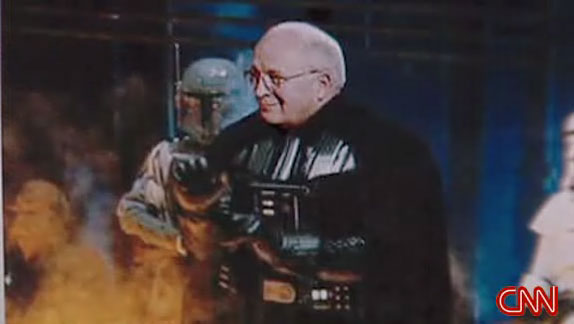The great Dick Cheney empathy testBy Mark Morford, SF Gate Columnist
Friday, July 16, 2010
Mark Wilson / Getty Images
The Great Dick Cheney Empathy Test (GDCET) is not for the faint of spirit. It requires tremendous fortitude, a deeply benevolent worldview, much unchecked screaming, and copious amounts of whisky. Also, reading. Do you have what it takes?
Former Vice President Dick Cheney disclosed Wednesday that he has undergone surgery to install a small pump to help his heart work, as the 69-year-old enters a new phase of what he called "increasing congestive heart failure." -- Associated Press
Here's how it works. You read the story above. You note how Dick Cheney, former vice president, Bush babydaddy, sneermaster supreme, befouler of nations, lover of war, hater of, well, almost everything else -- has undergone yet another major heart operation, this time to place a little valve-assisting pump (called an LVAD) in his withered and long dysfunctional ticker.
You then read how Dick is recuperating in intensive care following said installation -- which, by the way, is usually only a stopgap measure, just a delay tactic until the device in question gives out and the patient requires a full heart transplant. Is Dick a candidate for that? Doubtful. Also, they say LVADs are usually reserved for patients with end-stage heart disease, a last resort, the final straw. It is, they say, only a matter of time.
So it begins.
The first knee-jerk response to the Great Dick Cheney Empathy Test (GDCET) is, of course, the easiest, and the most obvious, the most available to your giddy puppydog consciousness, and my guess is it shot through you like a fast and wonderful lightning bolt of OH MY SWEET JESUS YES the instant you read the story above.
That response was, shall we say, not very subtle. It was, I'm guessing, a not-so-secret howl to the universe that the sooner Dick exits this earthly plane, the healthier, lighter and happier we will all be, planetwide. Dark shadows will lift, flowers will bloom more brightly, 10 million female uteri can finally unclench, and so on.
But then, perhaps you sigh, ponder, probe a bit more deeply. Is that how you really wish to be? What of those noble traits we all strive for: compassion, benevolence, forgiveness, a wan but merciful smile in the face of thine enemy's condemnatory sneer? Is wishing a scaldingly painful death on one of the worst and most shameful characters in American history really the right way to treat your fellow man? Any fellow man? Of course not. Well, maybe. No, no, definitely not.
After all, if you wish such a thing, what does that say? About you? About us? About this paragraph? Would we not all be wallowing on the same filthy level? Is it not similar to the death penalty argument so beloved by liberals, that no matter how vile the criminal, to wish death upon any human makes us just as base and ugly as those we deem to be evil? This is no way for an enlightened consciousness to evolve.
I know what you're thinking. And yes, passing the GDCET would require all your courage, all your gumption, willpower, whisky and every ounce of benevolent energy you can muster. You would have to invoke all your Jesus-flecked Buddha nature to turn the other cheek, love thy enemies, forgive the sinners -- basically dredge up every maxim, axiom, aphorism, proverb and Hallmark card you can think of, toss them into a karmic blender and shoot them straight into your wary soul like a desperate and godly emetic.
It ain't easy. You must first resist the very reasonable, insistent screaming of your calmly vengeful side, the one that would be very pleased indeed if Dick suffered a million scalding rashes and burned in hell with Jerry Falwell, Saddam and Strom Thurmond for all eternity. That would be wrong. Stop thinking that.
Perhaps a reversal is in order. Perhaps it's better to wish someone like Dick a longer life, so that he may bear witness to the well-deserved implosion of all his nefarious plans, his cronyist empire. The man is, by most accounts, responsible for countless thousands of innocent deaths, the acerbic tainting of our national identity, a flagrant mutilation of everything we once held dear. You sort of want the guy to feel it. Repeatedly.
Are you a seriously impassioned ultraliberal with a thing for vengeful whimsy? You might even take this notion a step further and hold out a flicker of hope that Dick will live long enough to one day be put on trial for his war crimes, hung in a public square, slowly eaten by swarms of feral pigeons. Or crows. Pugs. Whatever.
This is, of course, a total fantasy, akin to imagining Rush Limbaugh getting busted for snorting meth from a gay teenage hooker's thighs just after fellating Mel Gibson in Newt Gingrich's fetish dungeon. Doesn't matter. As long as Dick is alive, it's a fantasy that keeps many a liberal heart aflutter.
Maybe you sense there is no rush. Maybe you know there's need to wish Dick an immediate demise, given how everyone knows that before long he'll be taking the Great Escalator down to the basement. Surely a great reckoning is coming. In the grand arc of spacetime, what's a few more years?
Besides, will it not be lovely for Dick to witness Obama sail into his second term, replace a third of the Supreme Court with people who actually have souls, and overturn/reverse nearly every law, stance and spiteful stratagem with which Dick ever fouled the earth? You bet it will.
Or perhaps, finally, you can appreciate the value of a living Dick. Every culture needs its demons, yes? The villain is just as important as the hero. Dick has been, and continues to be, an ideal foil, the complete monster, the perfect perversion of humanity by which we can all measure subsequent people and deeds. You may look upon any modern atrocity, any upstart political ogre, any personal abuse and say, well, at least it's not Dick Cheney. That's something.
So, how did you do? Did you pass the GDCET? Fail instantly, way back up top, when you read the headline to this column? Not quite sure?
You might be like me. See, I try to wish no violence or death, illness or pain on my fellow man. I do not always succeed, but still I strive, every single day, with every breath, even if I can't always forgive or be as uniformly compassionate as I'd like, then at least to proffer kindness, to see the larger picture and above all, to refuse to let the poison enter my heart.
However, I'm quite sure I would not be the slightest bit displeased to learn that the laws of brutal karmic repayment have come into full, painstaking, searing effect on our boy Dick. No, I wouldn't mind that in the least. After all, it's the empathetic thing to do














